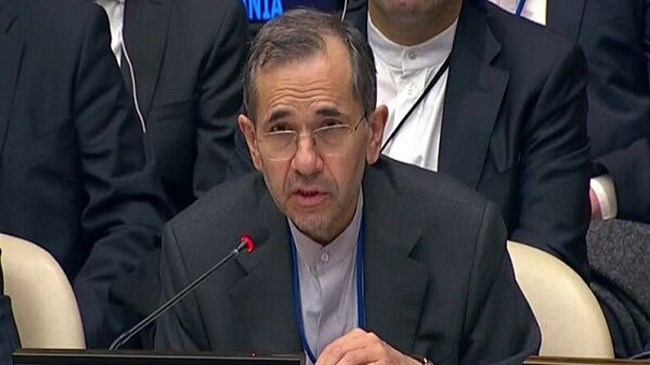Iran rejects renegotiation of JCPOA

Iran’s Permanent Representative to the United Nations Majid Takht Ravanchi said on Tuesday that any proposal for the revising, renegotiation or extension of the 2015 nuclear deal will be against Resolution 2231 and absolutely not acceptable to Iran.
He further noted that Tehran has paid huge costs to maintain the nuclear agreement officially known as the Joint Comprehensive Plan of Action (JCPOA), and the deal cannot be linked to any other issue.
Takht-Ravanch made the remarks during a virtual meeting of the UNSC for implementation of UNSC Resolution 2231, IRNA reported.
He said, “The JCPOA cannot be linked to any other issues as the agenda of the nuclear talks from the beginning was the nuclear issue. We decided not to allow other issues to complicate the already difficult negotiations. Any attempt now to link the future of JCPOA to extraneous issues will doom to fail.”
"Almost four months after the failed United States’ move to destroy the JCPOA, the Security Council is again considering the implementation of resolution 2231 and the JCPOA,” he said.
According to resolution 2231, the JCPOA was concluded as “a comprehensive, long-term and proper solution to the Iranian nuclear issue” in order “to build a new relationship with Iran” and to promote and facilitate “normal economic and trade contacts and cooperation with Iran."
The JCPOA is an agreement coming out of hard-won negotiations involving difficult gives and takes, and any proposal for its revision, renegotiation or extension will be against resolution 2231 and absolutely not acceptable to Iran.
After its withdrawal from the JCPOA on May 8, 2018, the US re-imposed all its nuclear-related sanctions, and since then, by pursing a hostile policy towards the JCPOA and Iran, has conducted persistent widespread public and private harassment of Iran’s business partners.
Referring to US “maximum pressure” policy against Iran that has been practiced defying international laws, Takht-Ravanchi said, “This left us with no choice but to take certain remedial steps in full conformity with the JCPOA’s paragraphs 26 and 36, according to which, in case of “a re-introduction or re-imposition of the sanctions”, Iran has the right “to cease performing its commitments …in whole or in part."
He added that Iran’s steps “are in full accordance with our rights and commitments under the JCPOA, and more importantly, are completely reversible.”
However, he noted the damages and sufferings inflicted upon Iran are almost absolutely irreversible.
“In the last four years, the U.S. has imposed over 1500 sanctions against Iran, targeting almost all sectors of our economy and cutting almost all dividends of Iran from the JCPOA.”
According to Takht-Ravanchi, it was an “all-out war wherein the economic means have replaced weapons.”
He added, according to the US officials, the objective of sanctions is the “starvation” of the Iranian people through weaponizing food and medicine, which is prohibited even in wartime.
The US' claim that humanitarian goods are exempt from sanctions is an absolute lie. As an example, even today, we cannot easily import medicine for relieving the breathing problems of those injured by chemical weapons which were provided by some western countries to Saddam and used by him during his aggression against Iran, said the senior diplomat.
He added, sanctions do not merely create economic hardships; in many cases, “sanctions claim the innocent lives of people from all walks of life.
“By any measure, the US sanctions are illegal, illegitimate, immoral, inhumane and oppressive, and have no designation other than economic terrorism and crime against humanity.”
Referring to the “orchestrated measures” of US and its regional allies during the past four years, Takht-Ravanchi said they were to destroy the JCPOA through “illegitimate and unlawful measures.”
The only source of instability and insecurity in our region is the presence of a large number of American forces in almost all Iran’s neighboring countries, the Persian Gulf and the Oman Sea as well as the flow of unprecedented amounts of the most sophisticated weaponry by the US and other Western countries to this region, said the senior diplomat.
Noting that the Persian Gulf region has been suffering from many years of foreign intervention, conflicts and unhealthy rivalries, Takht-Ravanchi said, “This region is turned into a powder keg as a result of unfettered flow of dangerous weapons from Western countries. In order to sell more weapons to this region, these countries sow discord and apply a divide and rule policy among countries in the region.”
It is high time for regional countries to engage in good faith and work toward the establishment of a better, safer and more prosperous region. Our Hormuz Peace Endeavor (HOPE) is a recipe for bringing regional countries closer to each other with the aim of resolving their differences and establishing friendlier relations among them. We hope that our honest and sincere call for opening a new page in regional cooperation will be heeded by our neighbors in the Persian Gulf soon, he concluded.
Source: Iran Daily

